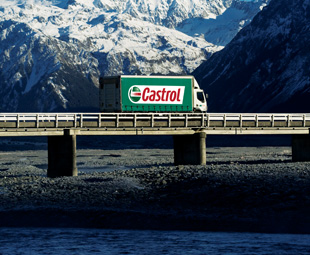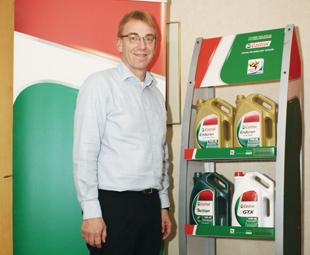A holistic approach

FOCUS on Excellence finalist, Castrol, hopes to expand its local operations by focusing specifically on the road transport sector. FOCUS finds out how it aims to distinguish itself in this highly competitive market.
Considering the reputation that Castrol has built for itself in South Africa, it is hardly surprising that the company has been nominated for the FOCUS on Excellence Award for Best Supplier of Lubricants. The company has been active in the country since 1929 and has in that time become a well-respected local brand. One needs only think of Castrol’s popular television advertisements, for example, to realise that it has successfully established itself as a truly South African company.
But, even taking this into account, it is still difficult to overestimate the success that the company has enjoyed locally. Consider this: even though Castrol is a global company with operations in virtually every region of the world, South Africa is still one of the company’s 10 biggest markets.
“South Africa is an incredibly important region for Castrol,” says Peter Weidner, vice president Europe and Africa, BP Automotive Lubricants. “Unlike many other parts of the world, the majority of goods here are transported by road. Where rail transport is often used in other countries, trucks form the core of South Africa’s freight transport system. For a company that offers lubricants, this obviously represents a tremendous opportunity.”
And it is this dependence on road transport – combined with excellent road infrastructure and a well-established commercial vehicle industry – that has influenced Castrol to focus specifically on the transport sector.
“Going forward, the transport industry will be a key focus for Castrol in South Africa,” states Baskaran Jayaraman, marketing manager, BP Lubricants Africa. “We believe that this industry offers a lot of potential and we want to expand our activity in this market.”
Transport operators, however, have very specific demands. The importance of keeping running costs as low as possible – especially during tough economic times – means that companies like Castrol must be able to offer operators solutions that assist them in keeping operations as efficient as possible.
Cognisant of this fact, Castrol has invested heavily in creating products and services that can truly assist customers in keeping costs down to a minimum.
“Castrol spends a lot of time and money on developing products that can improve engine performance and decrease fuel consumption. Importantly, however, we look at the entire driveline,” asserts Weidner. “Every component is important when developing lubricants that improve engine performance, and because of this, Castrol takes a holistic view when creating its products.
“Of course, being part of the BP group is very beneficial in this regard,” continues Weidner. “Through BP we have access to a lot of information about the latest fuel technology and this allows us to develop lubricants that can get the most out of these fuels.”
In line with this philosophy – and with the aim of getting as much as possible out of a vehicle’s engine – Castrol often partners with original equipment manufacturers (OEMs) like Scania, MAN, Allison, ZF and ArvinMeritor by involving itself in the development of new commercial vehicle technologies right from the design stage.
“By partnering with OEMs during the design stage of new engines and components we are able to create lubricants that are specifically designed to get the most out of new vehicle engines. By getting involved at this early stage we have the opportunity to both provide input and gain a better understanding of how to maximise a manufacturer’s engine’s performance,” says Weidner.
 Partnering with OEMs, however, is only part of Castrol’s collaborative approach to maximising engine efficiency. The company also encourages close working relationships with customers.
Partnering with OEMs, however, is only part of Castrol’s collaborative approach to maximising engine efficiency. The company also encourages close working relationships with customers.
“Many of our account managers spend more time at our customers’ premises than our own,” says Jayaraman. “We look very carefully at customers’ operations and try to offer solutions that are tailored to their specific needs. We evaluate their operations and try to find ways of increasing fuel savings, boosting efficiency and extending drain periods – things that will allow the customer to significantly reduce running costs.”
With this in mind, the company also recently introduced the Castrol Fleet Programme, an initiative that is aimed at helping customers identify the combination of Castrol products that will allow them to get the most out of their vehicles. In addition, the programme also offers a number of value-adding interventions which include extended lubricant drain intervals using synthetic and semi-synthetic engine and driveline products, which bring demonstrated savings to fleet operators.
Another way in which Castrol tries to aid customers is by ensuring that the company does everything in its power to reduce downtime.
“Keeping trucks on the road is incredibly important. And because of this, we don’t want operators to suffer because we cannot guarantee product availability. That’s why we do everything in our power to make sure that our products are always available. Reliability is incredibly important in the transport industry,” says Weidner.
Indeed, reliability forms the core of Castrol’s philosophy regarding customer service.
“Castrol is a premium brand and this fact is evident in the quality of our product and the level of service that we offer,” asserts Weidner. “We provide a reliable service that is aimed at offering our customers long-term benefits. We aren’t simply selling products; we are building mutually beneficial relationships with transport operators. Because of this, we have to deliver on our promises and be dependable.
“And an important aspect of this is listening to customers’ opinions,” continues Weidner. “You have to listen to operators’ needs and bring products to the market that meet these needs. Castrol’s success is dependent on the goodwill of its customers, and if we don’t value their input, that goodwill will quickly disappear.”
Published by
Focus on Transport
focusmagsa





 FUSO: Driving the Future of Mobile Healthc
FUSO: Driving the Future of Mobile Healthc



 New Electric Van Range Unveiled!
New Electric Van Range Unveiled!  A brand
A brand




 Wondering about the maximum legal load for a
Wondering about the maximum legal load for a 
 The MAN hTGX powered by a hydrogen combus
The MAN hTGX powered by a hydrogen combus


 Exciting News for South African Operators
Exciting News for South African Operators






